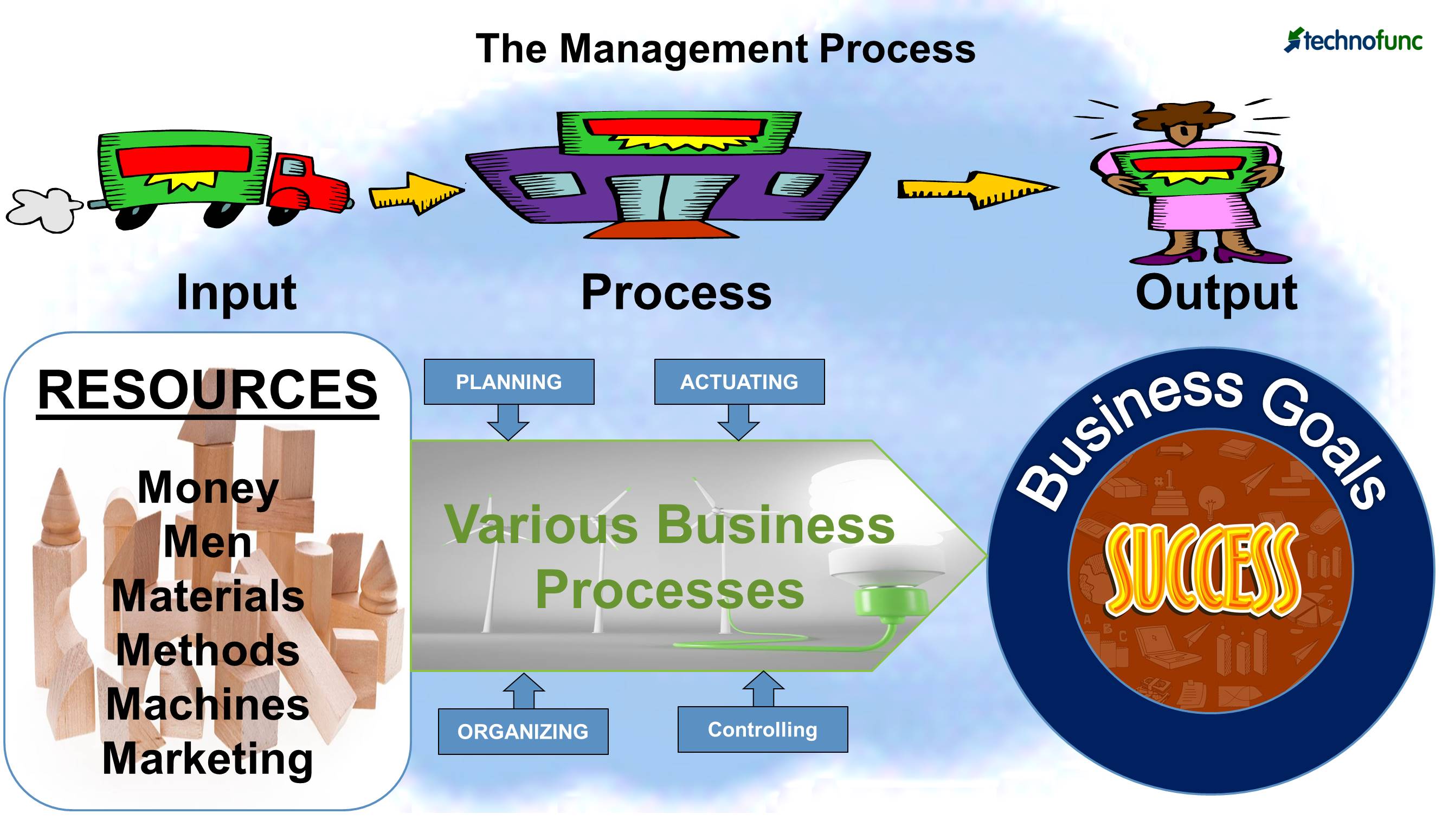- Home
- Business Processes
- Industry Knowledge
- Aerospace Industry
- Automotive Industry
- Banking Domain
- BFSI Industry
- Consumer/ FMCG Industry
- Chemicals Industry
- Engineering & Construction
- Energy Industry
- Education Domain
- Finance Domain
- Hospitality Domain
- Healthcare Industry
- Insurance Domain
- Retail Industry
- Travel and Tourism Domain
- Telecom Industry
- Leadership Skills
- eLearning
- Home
- Leadership Skills
- Leadership & Management
- Concept of Management
Concept of Management
The concept of management refers to the process of planning, organizing, staffing, directing, coordinating, and controlling to achieve organizational goals. It is the management of human, physical, financial, and other valuable resources of the organization in an effective and efficient manner to achieve business objectives.
Different people have conceived and defined management in different ways. But, the essence of management lies in determining worthwhile goals and then carefully selecting and utilizing resources through efficient and effective planning, organizing, actuating, and controlling to achieve those goals.
Who is a Manager?
You are a manager. What does this mean? The word derives from the ancient French word for handling horses and a later one for handling the affairs of the kitchen. Cynics might replace horses with donkey, but all would see the analogy of keeping an organization alive through the activities of the kitchen. Probably the one that is most simple, popular, and often quoted by many in general is "getting things done through other people."
Let us now look at different definitions that highlight important aspects of management.
- Management is a distinct process consisting of activities of planning, organizing, actuating and controlling, performed to determine and to accomplish stated objectives with the use of human beings and other resources (Martin, 1977).
- Good management is merely the exercise of common sense and the Golden Rule (Daniel, 1976)
- The six M’s (money, men, materials, methods, machines, and marketing) of management or the basic resources, as they are often called, are subjected to the fundamental functions of management - planning, organizing, actuating, and controlling -to achieve stated objectives.
- Management is an art struggling to become a science.
- Management science is a body of systematized knowledge accumulated and accepted with reference to the understanding of general truths concerning management.
- The art of management is a personal creative power plus skill in performance. The contemplation of problems, events, and possibilities develops personal creative power, while experience, observation, and study of results contribute to skilled performance. It other words, management art involves envisioning an orderly whole from chaotic parts, communicating the vision, and achieving the goal. It is the "art of arts" because it organizes and uses human talent (Boehringer, 1975)

From these definitions, we can infer that the principles and the techniques of management are not only applicable to the business world but they can be equally applied universally. They also find application in social, religious, charitable, and non-profit organizational contexts.
Essentially we can conclude that management is the integration of human and other resources in a manner that leads to effective utilization and harmonization of the individual efforts with organizational goals.
Suggested Reading and Resources
Related Links
You May Also Like
-
Frederick Winslow Taylor started the “Scientific Management Movement”, and attempted to study the work process scientifically. Scientific management, also called Taylorism, was a theory of management that analyzed and synthesized workflows. It is a system for increasing the efficiency of manpower to its maximum potential and streamlining production to improve efficiency. This article explores this theory in more detail.
-
Emergent leadership occurs when a group member is not appointed or elected as leader, but rather that person steps up as the leader over time within-group interactions. Have you ever faced challenges in getting accepted into your new role of position as a leader? Groups don't automatically accept a new "boss" as a leader. Emergent leadership is what you must do when taking over a new group. Learn more about emergent leadership.
-
The concept of management refers to the process of planning, organizing, staffing, directing, coordinating, and controlling to achieve organizational goals. It is the management of human, physical, financial, and other valuable resources of the organization in an effective and efficient manner to achieve business objectives.
-
Teams are part of the modern organizational culture. Whether you are a team leader or a team member, having a better understanding of how teams work, and being able to identify where the team is in the process, is a critical part of ensuring the team is ultimately successful. Start with the basics and understand what a team is and what role they play in an organization.
-
Certain generally accepted truths or principles of communication are important to consider when communicating with others. These principles hold true for all people in every culture. By understanding these principles, you will experience greater communication effectiveness. An effective communication system is one that achieved its objectives. Communication is effective where there are no barriers to communication.
-
Administrative Theory by Fayol
The administrative theory of management is focused on principles that could be used by managers to coordinate the internal activities of organizations. The most prominent of the administrative theorists was Henri Fayol. Fayol observed a work stoppage and judged it to be a management failure. He believed that organizational managerial practices are important for driving predictability and efficiency in organizations.
-
Team Foundation in Forming Stage
This is the first stage of team development. This is the stage when the foundation of the team is laid. During the Forming stage, team members have a high dependence on their leader for guidance. Learn the practical strategies you can use during this stage to help your team develop into a highly effective performing team.
-
All the teams are dynamic in nature and they take time to come together, they form, develop, and grow in stages, over a period of time. Teams go through five progressive stages: Forming, Storming, Norming, Performing and Adjourning. In this article, we want to introduce you to these stages of team development and certain strategies that you can use to help the team grow and develop in each of these stages.
-
Productivity is defined not in terms of the number of goods produced, but in terms of value-added per employee. Customers don’t really buy goods and services but in fact, they buy a value - something they value. The future is all about tangible products fulfilling intangible needs. Ideas like this can transform a business and provide them a competitive advantage to thrive in the future.
-
The best career choices are ones that match your values. Each person has several values that are important to him. These values are highly personal and knowing them provides a clearer sense of what's most important to you in your life and career. Career values are the beliefs you consider important from a work standpoint. Values help you understand what you want from a job? Explore a few examples of work values that can influence career path and job satisfaction.
Explore Our Free Training Articles or
Sign Up to Start With Our eLearning Courses

About Us
Learning
© 2023 TechnoFunc, All Rights Reserved










